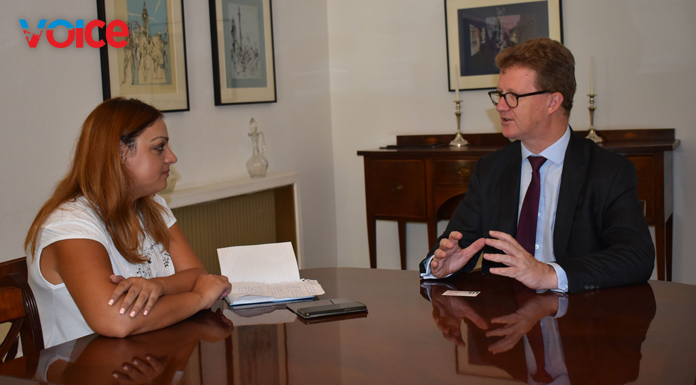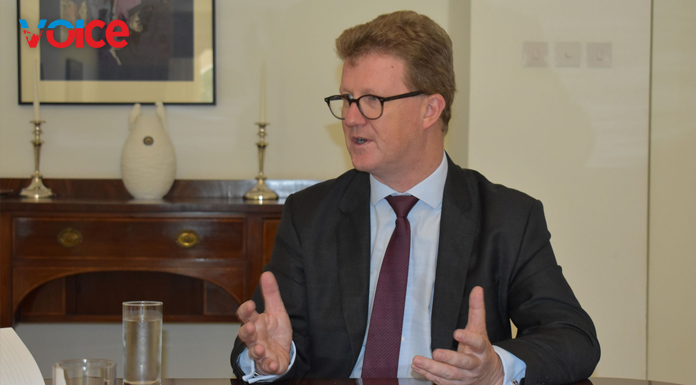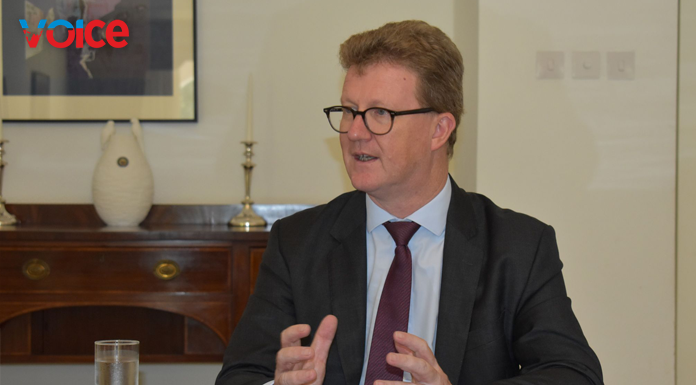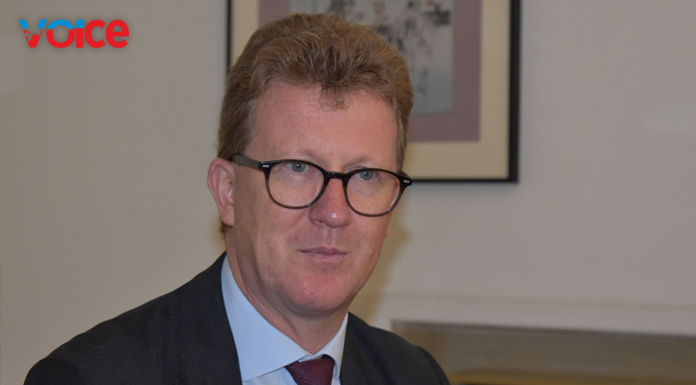British High Commissioner to Cyprus Stephen Lillie shared his thoughts that there has been a long-standing lack of dialogue between Greek Cypriots and Turkish Cypriots, which makes the situation difficult:
Eleni Constantinou
British High Commissioner for Cyprus, Stephen Lillie, emphasized the need to return to the right negotiating framework for the solution of the Cyprus dispute. Lillie said that the British government believes it is time to return to the negotiations after the Turkish Cypriot leader election, and that it is very important for the two communities to come together.
Lillie also touched on the need to reduce tensions in the Eastern Mediterranean and the normalization of Turkish-Greek relations. Regarding the changes to be made for Cypriot students from the next academic year, Lillie talked about the new student visa.
British High Commissioner for Cyprus Stephen Lillie answered our questions regarding the Cyprus peace process, Turkish-Greek relations, the situation in the Eastern Mediterranean and higher education in the UK.

“REGARDLESS OF THE LEADERS OF THE TWO COMMUNITIES, OUR WISH IS THAT EFFORTS TO SOLVE THE CYPRUS PROBLEM WILL BEGIN AGAIN”
QUESTION: How do you evaluate the current situation in the Cyprus dispute? Does the long-term lack of dialogue complicate matters?
LILLIE: There has been a lack of dialogue for a long time. It proves the need to move the process forward and make progress, as little has been done since Crans-Montana. In addition, the increasing tension in the Mediterranean made the situation even more complex. Also, there are intense discussions about Varosha. Eventually, all this shows the importance of returning to negotiations. The British government believes it is time to return to the negotiations after the Turkish Cypriot leader election.
QUESTION: The election of the new Turkish Cypriot leader will be decisive for the developments. Does it matter who will be chosen for the future?
LILLIE: It does not matter who will be chosen. The British government does not interfere in the election of the Turkish Cypriot leader. Regardless of the leaders of the two communities, our wish is that efforts to solve the Cyprus problem will begin again and the two communities will come together and find common ground and discuss. There are others who also support this process. The United Nations and the United Kingdom support this as guarantor states. But first, the two communities must come together.
QUESTION: The issue of guarantors is a point that will be dealt with when the time comes for the international conference on the Cyprus problem. What is your opinion on the subject?
LILLIE: If Cypriots want to decide on new regulations, then the British government has no reason to stand before any decision.
QUESTION: UN Secretary-General Antonio Guterres stated that after the elections in the Turkish Cypriot community and the convening of five-party meeting, the negotiations on the Cyprus problem should continue. What are the thoughts of the guarantor powers?
LILLIE: The UK is showing interest as a guarantor power. But the issue with guarantors is only one parameter. Major issues mainly concern the division of powers between Greek Cypriots and Turkish Cypriots, political equality, withdrawal of troops and other issues agreed in Crans-Montana.

“WE ARE CONCERNED ABOUT TENSIONS IN THE EASTERN MEDITERRANEAN”
QUESTION: While there is intense mobility in the Eastern Mediterranean region, the US and Russian Foreign Ministers and French officials have visited Cyprus. How do you evaluate this interest of the Republic of Cyprus either for defense cooperation or for granting of facilities?
LILLIE: We are concerned about tensions in the Eastern Mediterranean which is a very important region. We are concerned about any developments that cause increased tension. Both the tension between Greece and Turkey and that between Turkey and Cyprus must be de-escalated. We encourage dialogue between Greece and Turkey so that they can resolve their differences through negotiations, and we welcome the relevant agreement announced on Tuesday. Also, more generally in terms of tensions in other countries, we encourage the de-escalation of tensions there as well.
QUESTION: What do you think about the agreements between Cyprus and other states?
LILLIE: England is not worried, why should worry? We have excellent relations with Cyprus and the USA is our ally. We are not worried about the close relations of Cyprus with the USA. Cyprus has the right to develop friendly relations or trade and defense alliances with countries such as the United Kingdom, France, the United States of America.
“STUDENTS WILL BE ABLE TO APPLY FOR A STUDENT VISA WITH THE NEW POINTS-BASED SYSTEM”
QUESTION: This academic year is the last academic year for EU students, in which discounted tuition fees as well as cheap student finance rights are valid. Are you worried that this will negatively affect the UK’s choice as one of the best destinations for study?
LILLIE: First, let us clarify that Cypriot students (Greek Cypriot and Turkish Cypriot) will always be welcome in British universities and we appreciate their contribution to our academic institutions. The increase in tuition fees starting from the next academic year is a result of the British decision to remove the UK from the EU. Therefore, the same conditions apply to all students from third countries. It will be the parents’ decision to send their children for education in the UK. What I want to say is that our universities, with various study programs offer one of the best and most valuable education services in the world. In some courses the tuition will not be much different from what it is today.
QUESTION: At least, have you considered any alternatives for students who will have to complete military service first?
LILLIE: The state does not control the universities. Universities are independent organizations and have the flexibility to approach some cases individually, like Cypriots who have gained a place in UK universities but must continue their military service. As we have told students and their families, especially those who will study in the next academic year, should contact universities directly to find out if any arrangements can be made. For this academic year, students can apply for the European Settlement Scheme. Thus, they can have the opportunity to stay and work in the country for a long time after their education.

QUESTION: Will there be any facilities regarding residence status?
LILLIE: With the new points-based system to be implemented from next year, they will be able to apply for a student visa. Specifically, to apply for a student visa, a minimum of 70 points is required. In addition, those with a bachelor’s or master’s degree can stay and work in the country for 2 years after their graduation. Doctorate holders can stay for 3 years. There is no limit to how many people will be granted a visa.
Voice of the Island 2020











